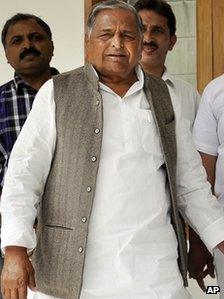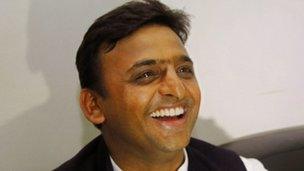Profile: Mulayam Singh Yadav
- Published

Mr Yadav is one of India's powerful regional leaders
Mulayam Singh Yadav has bounced back with his Samajwadi Party winning the assembly elections in the politically-crucial Indian state of Uttar Pradesh.
A former wrestler, the election results prove that he can still pin his opponents down.
His drive - combined with the skill to bounce back from seemingly hopeless political setbacks - has made him a formidable political adversary in Uttar Pradesh, India's most populous state with more than 200 million people.
In his long political career he has been the state's chief minister three times and also served as India's defence minister.
He is now set to become chief minister for the fourth time since 1989.
Although Mr Yadav, 72, has not been in good health for the last few years and has been grooming his eldest son Akhilesh as his heir, nothing seems to deter this dogged political campaigner from returning to the electoral podium in a career that has been characterised by extreme highs and lows.
Bedrock support
Trained as a teacher in his home village in central Uttar Pradesh, Mr Yadav took the plunge into politics at the age of 15. He was influenced by the writing of well-known socialist Ram Manohar Lohia and took part in various socialist movements led by this ideologue.
In his early career, Mr Yadav championed the cause of the lower castes and minorities. They still provide him with bedrock support.
He has been able to exploit a growing perception among many voters in Uttar Pradesh - regardless of which party he represented - that the Congress party was the home only of high caste Brahmins or the elite.
Mr Yadav emerged as the youngest member of the state assembly when he contested elections in 1967 for a socialist party. He was elected in 1974 and again in 1977, when he romped home, still as a fervent socialist, but representing a different party.
Typical of the mercurial nature of Mr Yadav's career were the elections of 1980. For the first time he lost amid a surge of support for Congress.
But he still managed to be inducted in the upper house of the state legislature where he promptly rose to become leader of the opposition.
A few years later he took the unusual step of getting elected to the lower house of the state legislature as well - thereby achieving the distinction of being the only leader to have held the position of leader of the opposition in both houses.
His first stint as chief minister in Uttar Pradesh - from 1989 to 1991 - was shortlived but not uneventful. It culminated with his party formally separating from Congress, whose support it depended upon.
Hero
What cost him dear in the vote was his decision to order security forces at the Ayodhya mosque to fire upon mostly Hindu protesters who had seized it from a group of Muslims. The protesters argued that the mosque had been built on top of a Hindu temple.

Mr Yadav has been grooming his son Akhilesh to be his political heir
His actions during the Ayodhya stand-off were condemned by Hindus and Muslims alike. The former accused him of being excessively heavy-handed while the latter said he did not do enough to stop Hindu mobs going on the rampage.
It was only when the mosque was pulled down in December 1992 that Mr Yadav emerged as a hero among Muslims, who then credited him for saving the shrine in 1990.
In the elections of 1994, following a prolonged period of presidential rule in Uttar Pradesh, Mr Yadav found himself back in power - this time with the support of a new ally, the Bahujan Samaj Party (BSP).
But it was a relationship that did not last long. In June 1995 BSP leader Mayawati pulled the rug from under his feet and upstaged him to become chief minister herself with the support of the right wing Bharatiya Janata Party (BJP).
The two leaders have alternated in power for much of the time between then and now.
Mr Yadav's humiliation at the hands of Mayawati was hard for him to swallow, but his time in the political wilderness was short-lived.
Unpredictable
In the summer of 1996, he won his first break in central politics when he was appointed defence minister of India in a United Front coalition led by HD Dewe Gowda.
Ambitious as ever, at one point Mr Yadav even tried to become prime minister, but he always lacked a strong support base despite being at the centre of ceaseless political intrigue.
Evidence of this was clearly seen when he took the decision to oppose Sonia Gandhi's candidature for prime minister after the fall of the 13-day Atal Behari Vajpayee government in 1996.
Mr Yadav described her as a "videshi" (foreigner) - a mistake that came back to haunt him when Mrs Gandhi and Congress refused to support him when he needed it - while trying to form a government in Uttar Pradesh as the single largest party following elections in February 2002.
Their refusal meant his arch-rival Mayawati was able to seize the moment instead.
As on previous occasions he did not allow this setback to linger - he won back the position of chief minister for the third time in 2003 and held it until state assembly elections of May 2007 when he again lost to Mayawati.
For this year's elections, Mr Yadav again cultivated political alliances - this time with a breakaway leader of the BJP.
The move was dangerous because it could have damaged his Muslim vote bank - the BJP is loathed by many Muslims in Uttar Pradesh for its role in the Ayodhya dispute.
It is another interesting phase in the career of this most unpredictable politician who, at different stages of his career, has been politically in bed - and at loggerheads - with a wide spectrum of Indian parties.